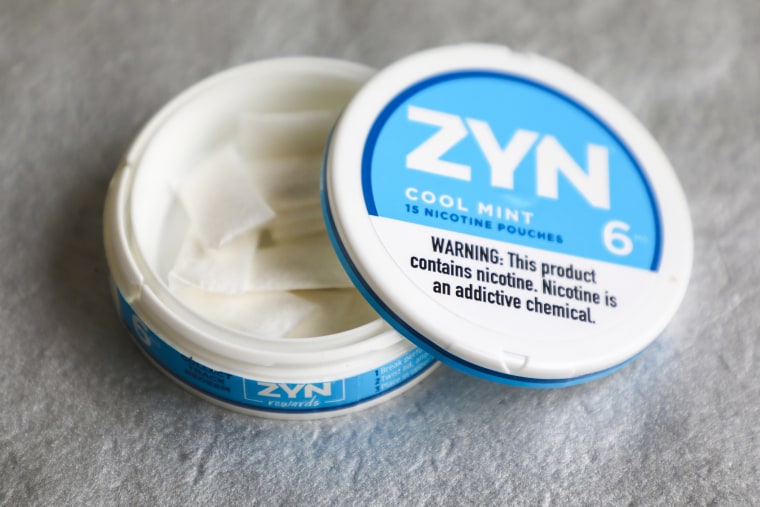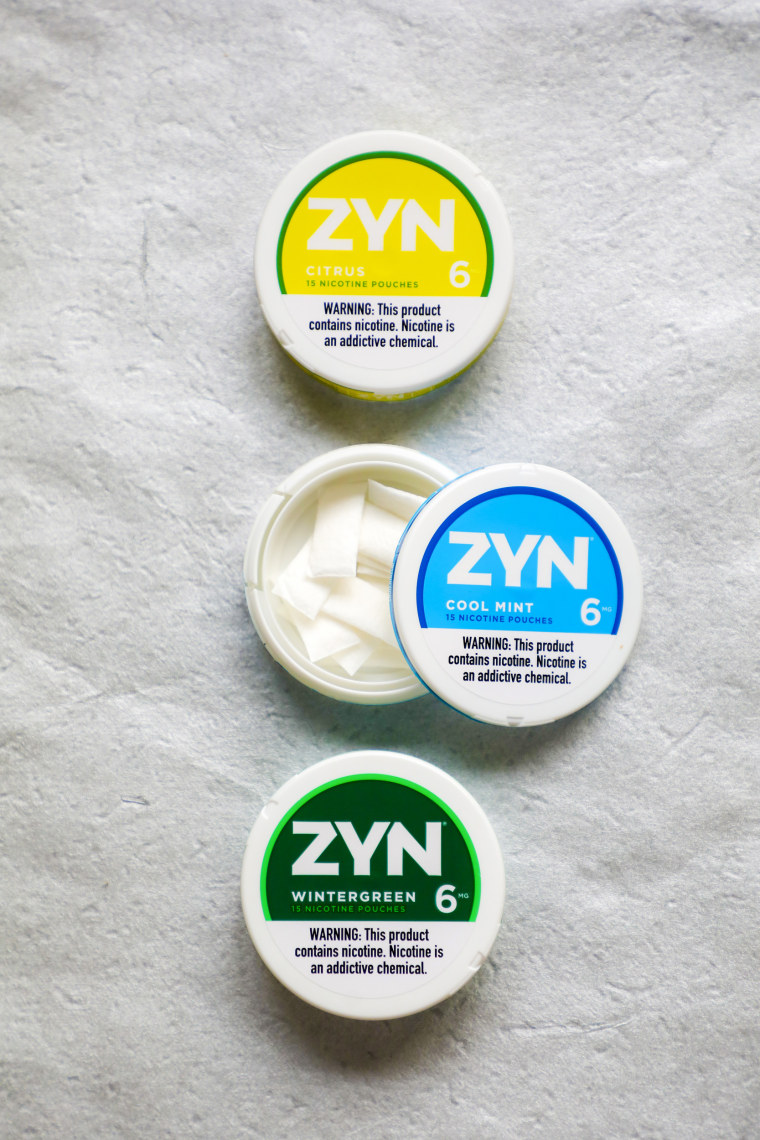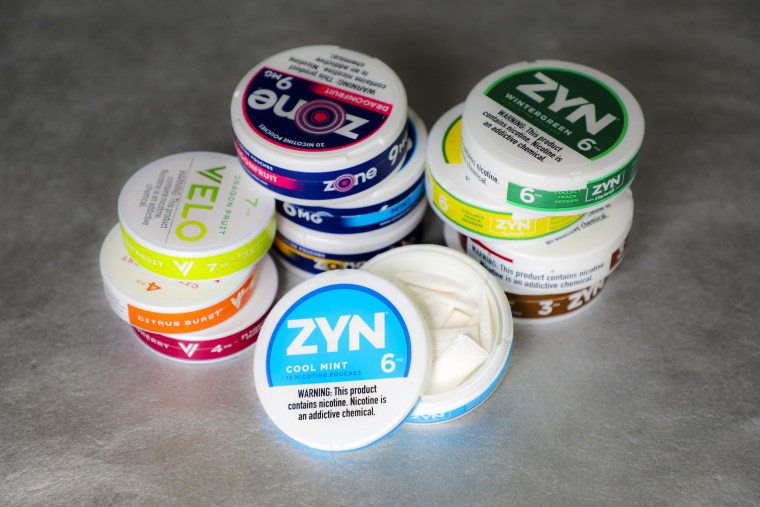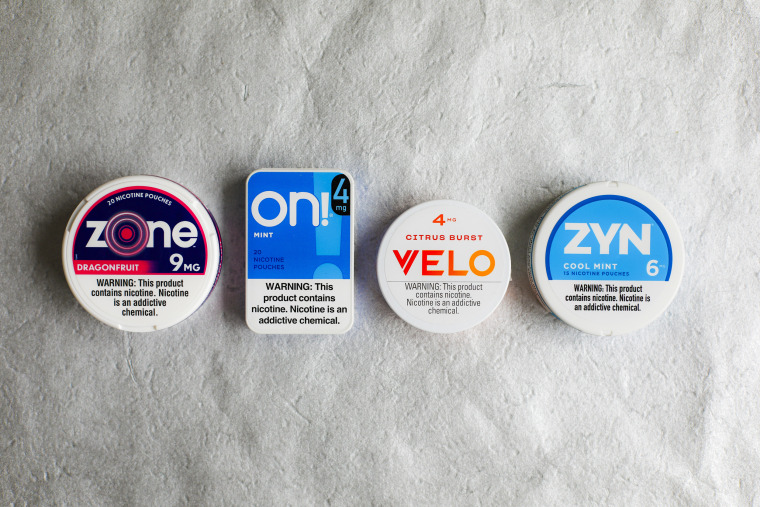Will Llamas wasn’t a regular tobacco user when a friend first introduced him to Zyn nicotine pouches.
“I had convinced myself, because there wasn’t any tobacco, these were pretty safe,” Llamas, of Stamford, Connecticut, said. “I liked how it made me feel. It tasted good. And so I was hooked.”
The 32-year-old said he quickly became addicted to Zyn, using up to 20 pouches a day. The pouches come in 3- or 6-milligram doses of nicotine in a variety of flavors, including coffee, mint and citrus.
“It gives you a shot of dopamine, so you just feel a little energized, happier, almost focused,” Llamas said.
Nicotine pouches like Zyn have soared in popularity in recent years. Zyn, a Swedish brand, was acquired by Philip Morris in 2022, and in the first three months of this year, more than 131 million cans were sold, an 80% percent increase from the same time last year. Last month, a shortage of Zyn sparked outcry on social media. Other products include Rogue, Velo and On!. Most are marketed as smoke-free, spit-free and hands-free alternatives to cigarettes and other tobacco products.“Usually when you say that something is free of something, it makes it seem less harmful,” said Tory Spindle, associate professor of psychiatry and behavioral sciences at Johns Hopkins School of Medicine in Baltimore. “Our concern is that, well, does that make them more appealing to someone that otherwise would have never tried any tobacco product?”
While Spindle said nicotine pouches — which users tuck between their lip and gums and later discard — could serve as a better alternative for established tobacco users, “the challenge is, how do you make the products accessible to someone like that, while not inadvertently addicting a new wave of individuals who never would have tried nicotine?”
In a statement, Philip Morris said it is “committed to developing products such as Zyn that are scientifically substantiated as a better alternative to continued smoking.”
Llamas said he had tried other smokeless tobacco products, but didn’t like the taste.

“It was honestly pretty disgusting, so the benefits weren’t there,” Llamas said. “I was not addicted to those, but these were a whole different beast,” he said, referring to Zyn.After about a year of using Zyn, however, he started to experience gastrointestinal problems — issues he said he now attributes to the nicotine pouches.
“I got many tests done. I went to a hospital. I got an ultrasound, I got a colonoscopy, and all they found was that my stomach was inflamed,” he said. After researching his symptoms online, he thought the source of his problems may be the pouches. “I haven’t had stomach issues since the day I quit cold turkey.”
Llamas wears an Apple Watch every day and said the device detected that his resting heart rate dropped by 10 beats per minute after he stopped using the pouches.
“I really wish I had more information when I took my first pouch,” he said. “If I had known that it was going to cause me so many health issues, I wouldn’t have started.”
Negative health effects
Dr. Donna Shelley, professor and vice dean for research at the New York University School of Global Public Health, said that while nicotine pouches don’t cause the same health problems as products containing tobacco, she wouldn’t call them “safe.”
“Some of the negative health effects of the nicotine pouches include gastrointestinal symptoms, like nausea, gum soreness and ulcers, and also some cardiovascular risks like elevated heart rate,” said Shelley, who researches tobacco control, adding, “We don’t know the full safety profile yet.”

A 2023 study that compared Zyn pouches to smokeless tobacco and nicotine replacement products found that while Zyn doesn’t contain “nitrosamines or some of those real known cancer-causing agents, it does contain some chemicals like formaldehyde that the FDA has said are potentially harmful,” she said.Dr. Varisha Parikh, a prosthodontist at Parikh Prosthodontics in Los Angeles, has warned of the potential dental health effects of nicotine pouches on social media.
“Placing something on your gum tissue for a prolonged period of time, that is a chemical agent, you’re just asking for issues in that area,” she said.
Sydney Cunningham said she has gum recession from using Zyn. The 30-year-old, from Safford, Arizona, picked up the habit while pursuing her doctoral degree because she “wanted an extra kick” to help her focus and study for exams.
“I put the Zyn pouches in the back of my mouth as far as I can, kind of near the wisdom teeth on the upper side of my mouth,” Cunningham said. “And that is where I’m having these gum issues.”

One of the major concerns medical experts have is that these products aren’t just being used by adults, but by kids and teens.
“When young people use nicotine, it changes the way their brains work. And what it can then do is set them up for a lifelong addiction to nicotine,” said Judith Gordon, a professor and associate dean for research in the college of nursing at the University of Arizona.
Spindle, who is studying how addictive the different flavors of nicotine pouches are, said that “they do seem to be pretty heavily marketed to youth.”
“The way it’s designed is exactly the sort of thing that makes it easy for adolescents to use and, you know, convenient, concealable,” said Vaughan Rees, director of the Center for Global Tobacco Control at Harvard T.H. Chan School of Public Health. The various strengths may make the pouches easier to start using, he said. “The way it’s designed may actually encourage use among youth rather than being a viable alternative for an adult smoker.”
A study published Wednesday in the Journal of the American Medical Association found that nicotine pouch use among adults in the U.S. remains low, despite the increase in sales.

The study, however, only looked at adults, said study co-author Adam Leventhal, the director of the Institute for Addiction Science at the University of Southern California. It’s possible, he said, that people who are underage are accounting for the increase in sales. “While the study was focused on adults, there are data that have been published, and forthcoming as well, that shows that an appreciable proportion of teens also use nicotine pouches at rates that are higher than what we found for adults,” Leventhal said.
Earlier this year, the Food and Drug Administration issued 119 warnings to retailers that were selling Zyn to underage kids.
“The FDA remains concerned about any tobacco product that may appeal to youth,” an agency spokesperson said in a statement.
The FDA is in the process of reviewing the marketing applications for Zyn and other nicotine pouches, though the agency has allowed the products to be sold in the U.S. in the meantime. Multiple medical organizations have asked the FDA to remove them from the market during the review period.
Last month, Phillip Morris suspended online sales of Zyn after questions about whether it violated Washington, D.C.’s ban on the sale of flavored tobacco. But the products are still widely available online through other sellers.

In a statement, Philip Morris said that “Zyn’s marketing is directed toward legal age nicotine users who are 21+.”It’s been six months since Llamas quit, but he said he still gets cravings.
“I don’t know if they’re ever gonna go away,” he said. Quitting was difficult, he added, because he would use a Zyn pouch doing pretty much every activity.
“So I had to relearn how to like these activities and my body has to create its own dopamine,” Llamas said. “So going to the gym, driving, you know, at work — all these things I had to relearn how to enjoy.”








Recent Comments